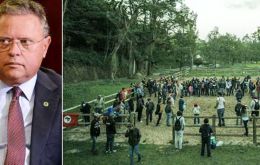MercoPress. South Atlantic News Agency
Agriculture
-
Wednesday, August 9th 2017 - 06:39 UTC
Beef and ethanol back in the EU/Mercosur agenda in October meeting

Beef will be back on the menu this October as the European Union seeks to finalise a trade deal with Mercosur. The European Commission will offer Mercosur new beef import quotas at reduced tariff rates during a formal round of trade talks in the first week of October in Brussels, EU sources confirmed.
-
Tuesday, August 8th 2017 - 17:46 UTC
Uruguay:British companies and agri-tech experts presented solutions for the agricultural sector.

On 28 July, British agri-tech experts and companies presented their work, products and services to Uruguayan companies and institutions at an event hosted at the British Residence.
-
Sunday, August 6th 2017 - 22:38 UTC
Bumper crops anticipate tough corn battle between leading exporters US and Brazil

Brazilian farmers are in the midst of collecting their biggest corn harvest ever, and American supplies are also plentiful -- setting the stage for a stiff battle to win world buyers in the second half of the year.
-
Saturday, July 29th 2017 - 11:46 UTC
Post-Brexit trade deals and serious obstacles when it comes to food

As the United Kingdom begins contacts to negotiate new trade deals as it leaves the EU in 2019, food will be one of many areas that will need to be addressed. The ongoing spat over chlorine chicken highlights how tastes and safety practices around the world can differ hugely, since what might seem normal practice in one country can seem problematic elsewhere.
-
Thursday, July 27th 2017 - 01:52 UTC
Brazilian landless peasants invade soybean plantation owned by Agriculture minister

Hundreds of landless farmers in Brazil have invaded and occupied a soybean plantation owned by a company belonging to Agriculture Minister Blairo Maggi. The takeover by some 500 people was organized by the Landless Rural Workers' Movement, which encourages the seizure of farmland it deems unproductive as a tactic to pressure the government.
-
Saturday, July 22nd 2017 - 08:13 UTC
Falklands' 2016 Census (I): Population 3.200; Camp increased 9%, for the first since 1950s'

The Falkland Islands government Policy and Economic Unit has released the 2016 Census Report (*) which indicates that the total number of people counted in the Islands on census night, 9 October 2016, was 3,354. This figure includes visitors to the Islands and people who are not normally resident in the country, for example tourists or crew on vessels in Falklands waters on census night.
-
Tuesday, July 18th 2017 - 05:11 UTC
Mercosur farmers will continue to vaccinate against foot and mouth disease

Mercosur Federation of Rural Associations consider inconvenient that the region should cease to vaccinate cattle against foot and mouth disease.
-
Tuesday, July 18th 2017 - 05:01 UTC
FMD outbreak in Colombia under control but origin remains inconclusive

The World Organization for Animal Health (OIE) reports that no further outbreaks of foot and mouth disease have been reported in Colombia, however, the investigation is ongoing.
-
Thursday, July 13th 2017 - 18:30 UTC
Global food commodity prices rose in June, led by wheat and meat prices.

The FAO monthly Food Price Index averaged 175.2 points in June, up 1.4% from May and 7.0% from a year earlier. The FAO Cereal Price Index rose by 4.2% in the month, amid surging prices of high-protein wheat due to deteriorating crop conditions in the United States of America. Maize prices, by contrast, declined amid record harvests in South America.
-
Thursday, July 13th 2017 - 09:26 UTC
British companies will visit Uruguay in a trade mission in September

The UK embassy in Montevideo is organizing a business visit to introduce Uruguay as an export market to British companies. The mission is primarily focused on agro-tech, taking advantage of Uruguay's main agriculture show in Montevideo during the month of September.